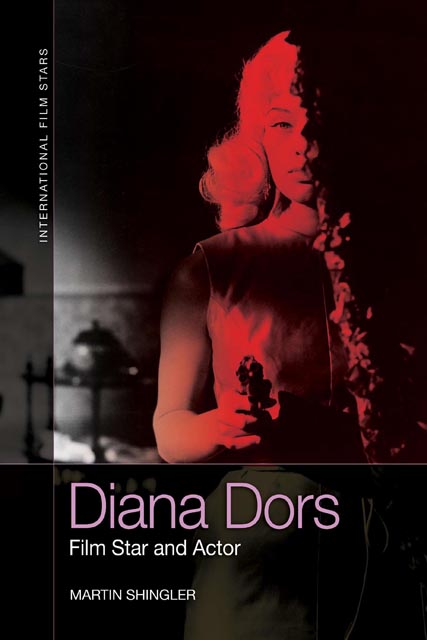8 - Popping in and out as a virtuosic guest star in The Pied Piper (1972)
Published online by Cambridge University Press: 14 July 2023
Summary
Based on the famous Grimm Brothers’ folktale of 1816, Jacques Demy’s The Pied Piper provided a small role for Diana Dors that showcased her virtuosic acting skills. The forty-year-old actress was billed as a ‘Guest Star’ when playing the Burgermeister's buxom, bossy and bad-tempered wife. She makes a big impression here as Frau Poppendick in some highly theatrical costumes, the actress deftly conveying her character's marital and maternal failings in just six short scenes. Although depicting her as an archetypal fairy-tale villainess, she draws heavily upon her own public image and screen persona, which was necessary given the brevity and scarcity of her scenes. This provides an opportunity to consider what well-known stars do with small character parts and how such seemingly incidental roles give them a chance to flex their acting muscles while exploiting their celebrity.
A children's tale for adults
The Pied Piper was an international collaboration between the UK-based Goodtimes Enterprises and the American-owned Sagittarius Productions that was shot on location in Bavaria and at studios in London. This ambitious project involved one of France's leading filmmakers directing a large cast of British and European actors with an internationally famous Scottish folk singer in the title role. After releasing several chart-topping albums in the 1960s – including Sunshine Superman (1966), Mellow Yellow (1967) and The Hurdy Gurdy Man (1968) – Donovan promised to draw a sizable music-loving crowd to see him play Hamelin's famous piper. Meanwhile, director Jacques Demy seemingly guaranteed that international film critics and art-house audiences would also flock to see his unique interpretation of this well-known fable.
On paper, Demy was the perfect candidate to create a whimsical musical folktale, one that could delight adults as much as children. After being nominated for an Oscar for his screenplay for Les Parapluies de Cherbourg/The Umbrellas of Cherbourg (1964), the French filmmaker enjoyed critical and commercial success across Europe and the USA, especially for Les Demoiselles de Rochefort/The Young Girls of Rochefort (1967). Yet Demy was also known to be artistically uncompromising, which proved disastrous when Model Shop (1969) was made at Columbia Pictures in Hollywood. His incest-themed Peau d’Áne/Donkey Skin (1970) proved unpalatable for many moviegoers, particularly those who found it too kitsch and gaudy to be taken seriously.
- Type
- Chapter
- Information
- Diana DorsFilm Star and Actor, pp. 118 - 127Publisher: Edinburgh University PressPrint publication year: 2022



